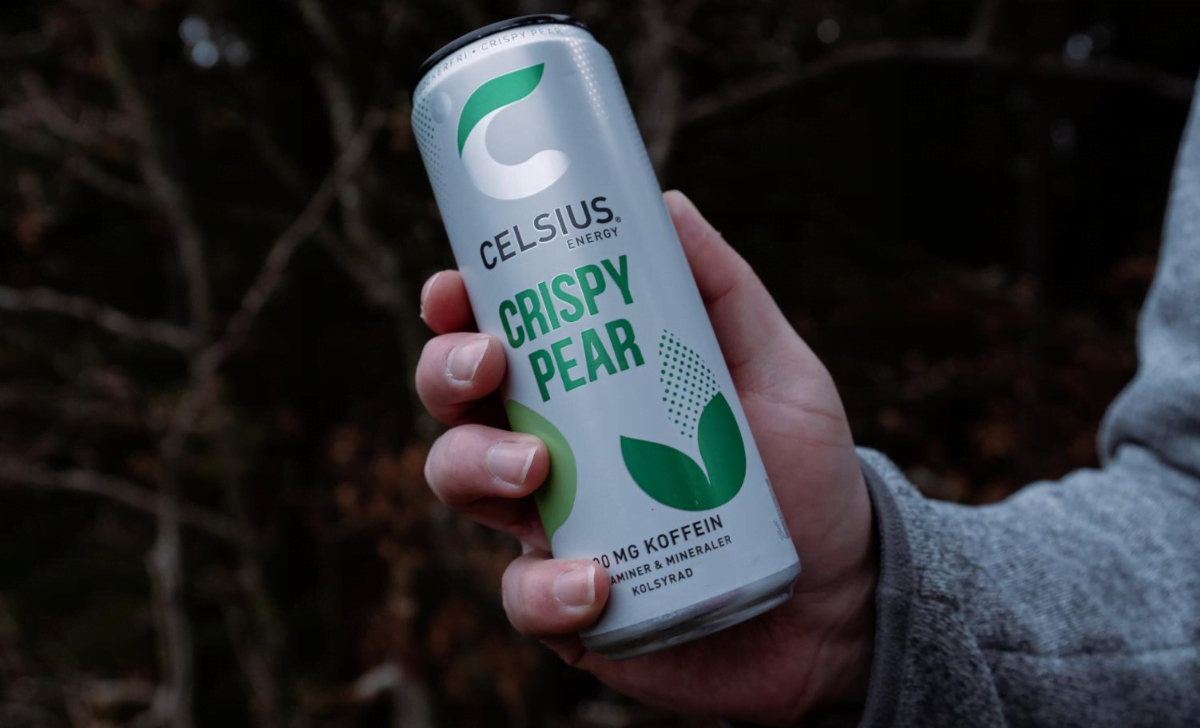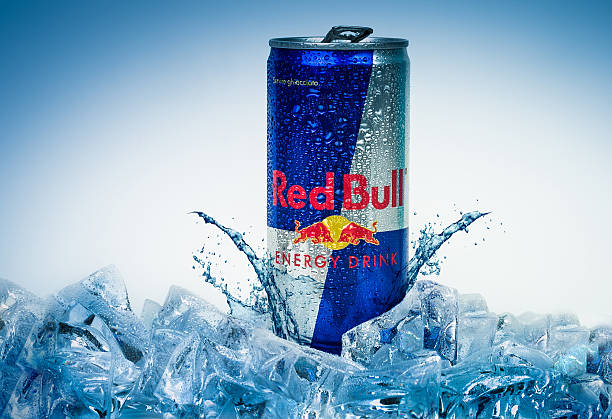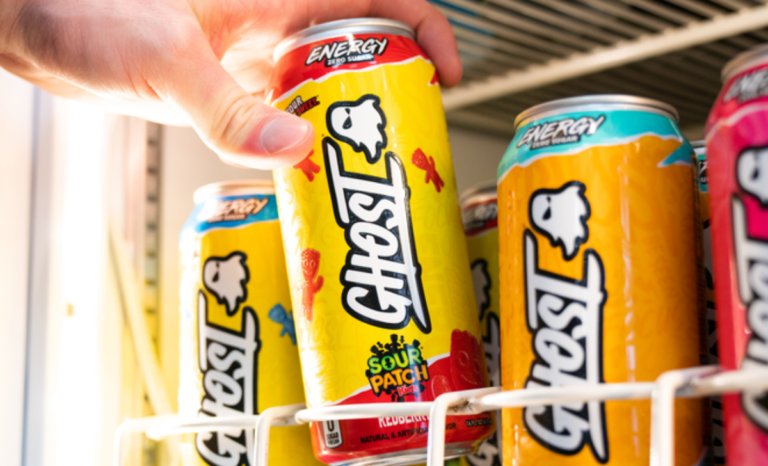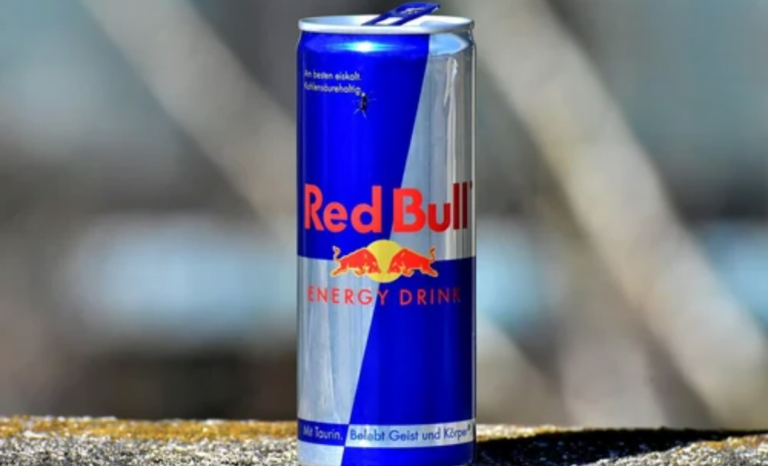The energy drink market has witnessed a surge in popularity, with brands like Celsius capturing the attention of consumers seeking a quick energy boost. Energy drinks have become a staple for many, with an estimated 43% of adults regularly consuming them.
Did you know that the global energy drink market is expected to reach $233 billion by 2027? This phenomenon is not surprising given the promises of increased metabolism and fat burning associated with Celsius Energy Drinks.
As the demand for functional beverages rises, it’s crucial to scrutinize the health claims and ingredients of products like Celsius energy drinks.
So, Are Celsius Energy Drinks Healthy for you, or do the health claims made by Celsius serve as mere marketing strategies? Let’s find out!
Celsius Energy Drinks
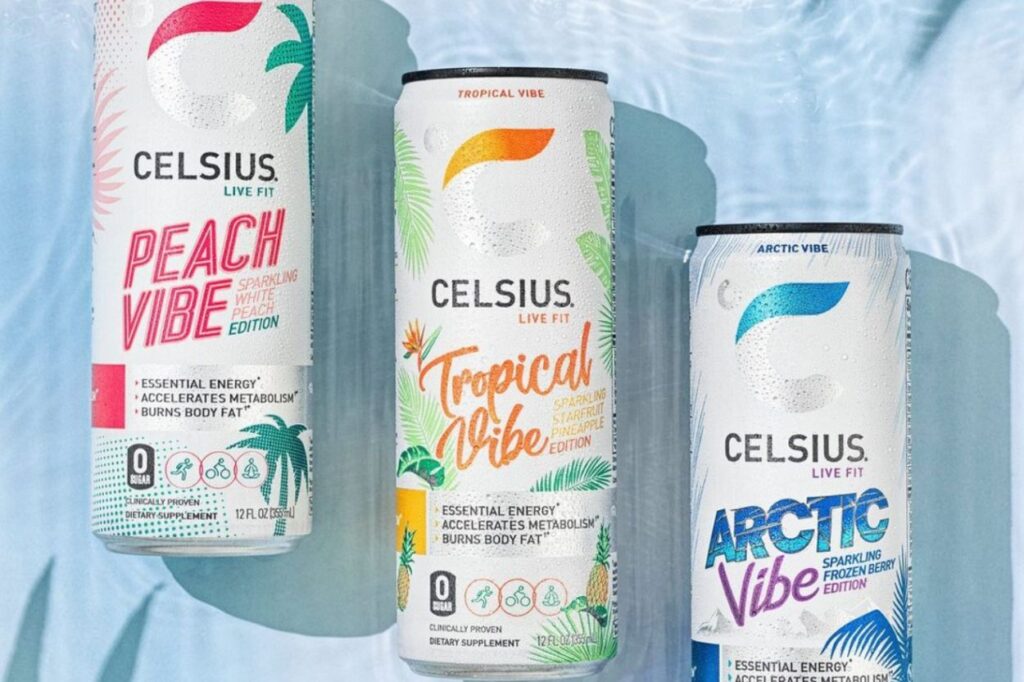
Celsius, a prominent player in the energy drink arena, boasts claims of fat burning, metabolism boosting, and heightened performance.
Tailored for fitness enthusiasts and those leading an active lifestyle, Celsius has garnered a dedicated following. However, are these claims substantiated by science, or are they clever marketing tactics?
Key features of Celsius Energy Drinks include:
Natural Caffeine Sources: Celsius derives its caffeine content from natural sources such as green tea extract and guarana, aiming to provide a smoother and more sustained energy boost compared to synthetic caffeine found in many other energy drinks.
No Artificial Preservatives or Sweeteners: The brand claims to be free from artificial preservatives and sweeteners. Instead, Celsius uses natural flavors and sweeteners like stevia.
Functional Ingredients: In addition to caffeine, Celsius includes other functional ingredients such as green tea extract, guarana, B-vitamins, and chromium. These ingredients are chosen for their potential to boost metabolism, burn fat, and support overall health.
Thermogenic Properties: Celsius markets itself as a fitness drink with thermogenic properties, suggesting that it may increase the body’s metabolic rate and, consequently, calorie burning.
Variety of Flavors: Celsius offers a variety of flavors like Prime hydration flavors to cater to different preferences, ranging from sparkling orange to wild berry and cola.
Target Audience: Celsius is specifically marketed towards fitness enthusiasts, athletes, and individuals leading an active lifestyle. The brand positions itself as a go-to choice for those seeking an energy boost before workouts or to power through a busy day.
It’s important to note that while Celsius positions itself as a healthier alternative to traditional energy drinks, individual responses to energy drinks can vary.
Please note that the claims made by Celsius about fat burning and metabolism boosting are not universally accepted by the scientific community.
Celsius Energy Drink Ingredients
While Celsius Energy Drinks are marketed as a healthier alternative to traditional energy drinks, it’s essential to critically examine the ingredients and their potential effects on the body.
Here are key ingredients found in Celsius Energy Drinks:
- Carbonated Filtered Water
- Citric Acid
- Natural Flavors
- Sucralose (Artificial Sweetener)
- Sodium Bicarbonate
- Potassium Citrate
- Ascorbic Acid (Vitamin C)
- Caffeine
- Gum Arabic
- Green Tea Extract
- Calcium Chloride
- Vitamin B12 (Cyanocobalamin)
- Guarana Extract
- Ginger Extract (Note: Some formulations may include this ingredient)
- Taurine
- Niacinamide (Vitamin B3)
- Pantothenic Acid (Vitamin B5)
- Pyridoxine Hydrochloride (Vitamin B6)
- Riboflavin (Vitamin B2)
- Biotin (Vitamin B7)
- Chromium Picolinate
- Folate (Vitamin B9)
- Steviol Glycosides (Stevia Extract) (Note: Some formulations may include this sweetener)
What is wrong with Celsius Drink Ingredients?
Celsius Energy Drinks, like many beverages, boast a combination of ingredients aimed at providing a refreshing and energizing experience.
However, it’s crucial to acknowledge that certain ingredients have been subject to scrutiny in various research studies, with potential negative effects on aspects such as metabolism, gastrointestinal health, and overall well-being.
Let’s talk about ingredients in Celsius and their potential effects on our body.
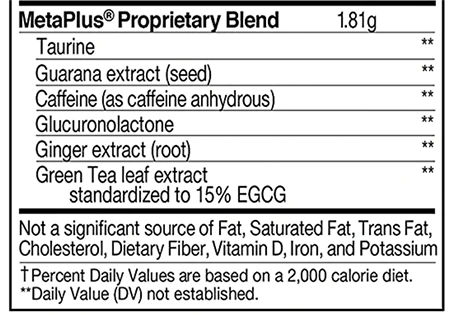
Green Tea Extract
Green tea extract, rich in antioxidants, is a key component in Celsius. It is derived from the leaves of the Camellia sinensis plant. Known for centuries for its medicinal properties, green tea has gained popularity in modern times due to its rich antioxidant content and potential health benefits.
The antioxidants in green tea, particularly EGCG, have been shown to neutralize free radicals, helping protect cells from damage caused by oxidative stress.
According to the National Library of Medicine, the ingestion of Green Tea Extract (GTE) on a short-term basis has demonstrated the potential to enhance fat oxidation during moderate-intensity exercise. Additionally, it has been observed to positively impact insulin sensitivity and glucose tolerance among healthy young men.
Some studies suggest that green tea extract may enhance metabolism and increase fat burning, making it a common ingredient in products targeting weight management.
While antioxidants can offer health benefits, excessive consumption of green tea extract has been linked to rare cases of liver toxicity.
The tannins in green tea can interfere with iron absorption, particularly for individuals with iron deficiency. If you take iron supplements, consider spacing them out from green tea consumption.
Additionally, the caffeine content in green tea extract may lead to adverse effects in individuals sensitive to caffeine.
Guarana Seed Extract
Guarana seed extract is a natural ingredient found in various energy drinks, including Celsius. Extracted from the seeds of the guarana plant (Paullinia cupana), native to the Amazon basin, this ingredient has been traditionally used by indigenous communities for its stimulant properties.
Guarana’s stimulant effects can be attributed to its high caffeine content. In fact, guarana seeds contain more caffeine than coffee beans. The caffeine is released slowly as the seeds are digested, providing a prolonged and sustained energy boost.
Guarana’s caffeine content works synergistically with caffeine from other sources like green tea extract in Celsius. This synergy aims to enhance alertness, reduce fatigue, and improve cognitive function.
Some studies suggest guarana may slightly increase metabolic rate, leading to modest calorie burning.
Some studies hint that guarana extract might positively impact cholesterol levels, potentially lowering LDL (bad) cholesterol and raising HDL (good) cholesterol.
According to experts, Guarana is not associated with any serious health problems. However, Similar to caffeine, guarana consumption can result in side effects such as insomnia, increased heart rate, and digestive issues.
When combined with other stimulants like green tea extract in Celsius, guarana can intensify the potential side effects of caffeine.
B Vitamins
Celsius drinks boast a notable presence of B vitamins, a group of essential water-soluble vitamins renowned for their crucial roles in energy metabolism, cellular function, and overall well-being
Celsius Energy Drinks feature a blend of essential B vitamins. Vitamin B6 supports cognition and immunity, while B12 aids energy production and red blood cell formation.
Biotin(Vitamin B7) contributes to metabolism and promotes skin health. Riboflavin(Vitamin B2) supports cell function, Niacin benefits skin and cardiovascular health, and Folate(Vitamin B9) is crucial for DNA synthesis.
According to Mayo Clinic, For individuals with sufficient B vitamin intake, additional doses can be unnecessary and potentially harmful. High doses can lead to side effects like nausea, vomiting, diarrhea, and even nerve damage.
Taurine
Celsius Energy Drinks typically contain taurine, a naturally occurring amino acid with various physiological roles in the body. Taurine is often included in energy drinks for its potential to enhance mental and physical performance.
Taurine acts as an antioxidant, helping to neutralize harmful free radicals in the body and potentially offering protective effects.
The benefits of taurine in Celsius are primarily based on isolated studies and require further research for conclusive evidence.
High doses of taurine, exceeding 3,000mg per day, might cause headaches, diarrhea, and anxiety. The exact amount of taurine in Celsius varies depending on the flavor, but most flavors contain between 200mg and 300mg per can.
Taurine is generally recognized as safe when consumed in moderate amounts. It is a naturally occurring component in many foods, including meat and fish.
According to experts, even though amount of Taurine present in energy drinks in quite low, but some users have reported diarrhea and constipation. There is not much evidence for this.
Artificial sweeteners in Celsius
Celsius Energy Drinks feature artificial sweeteners like sucralose and acesulfame potassium (Ace-K) to provide sweetness without added calories.
Sucralose is considered safe, with minimal metabolism and no caloric contribution, while Ace-K passes through the body unchanged.
Aspartame, a low-calorie sweetener, is metabolized, providing some calories, and should be avoided by individuals with phenylketonuria (PKU).
On the other hand, Celsius incorporates steviol glycosides derived from the Stevia plant, offering a natural, zero-calorie sweetening option.
These artificial sweeteners contribute to Celsius’ low-calorie profile, potentially aiding weight management and blood sugar control. However, individual responses vary, emphasizing the importance of moderation.
Studies suggest artificial sweeteners like sucralose may alter gut bacteria composition, potentially impacting digestion and long-term health.
Some studies propose that artificial sweeteners might disrupt the brain’s reward system, leading to increased cravings for sweet and calorie-dense foods.
Research in the “International Journal of Obesity” found that artificial sweeteners may not satisfy the brain’s craving for sweetness, potentially leading to compensatory overeating.
Artificial sweeteners, particularly aspartame, have been associated with decreased insulin sensitivity. A study reported that aspartame consumption impaired insulin sensitivity in healthy individuals.
Other Ingredients in Celsius
Glucuronolactone
Glucuronolactone is a natural compound produced in the body as part of the detoxification process. In energy drinks, it is often added for its perceived support in detoxifying processes.
Some research suggests GL might enhance energy levels and reduce fatigue, a potential contributor to Celsius’ invigorating effect.
Benefits of GL, especially in Celsius doses, lack strong scientific backing, requiring further research for conclusive claims.
High GL intake (exceeding 2g per day) might cause nausea, headache, and diarrhea.
Citric Acid
Used for flavor and acidity, citric acid is a common ingredient in beverages. It acts as a natural preservative, extending the shelf life of Celsius without the need for artificial additives.
However, according to health experts, excessive citric acid intake can contribute to tooth enamel erosion. It may also lead to gastrointestinal discomfort( GERD) in some individuals. Consideration of these potential drawbacks is essential for overall health.
Ginger Extract
Ginger extract is another ingredient in Celsius that is used to boost energy levels. Ginger boasts gingerols and shogaols, powerful antioxidants with anti-inflammatory properties, potentially benefiting individuals with conditions like arthritis and muscle soreness.
High doses of ginger can cause heartburn, diarrhea, and stomach upset in some individuals. Be mindful of your tolerance.
Natural Flavors
“Natural flavors” in Celsius, like many food and beverage products, can be a bit of a mystery. While the term sounds straightforward, the reality can be more complex.
The FDA defines “natural flavors” as those derived from botanical sources like fruits, vegetables, spices, herbs, and yeast. Sounds good, right?
Unfortunately, the definition allows for additional “processing” beyond simple extraction. This can include natural and artificial enzymes, distillation, isolation of specific flavor compounds, and even blending with artificial flavors.
Celsius doesn’t explicitly disclose the sources and processing methods of its natural flavors, making it difficult to know exactly what’s involved.
“Natural flavors” in Celsius, while derived from botanical sources, might involve processing and potential blending with artificial flavors.
Minerals
Celsius drinks contain certain minerals like calcium, sodium, and chromium, each playing a distinct role in the body.
The amounts of calcium, sodium, and chromium in Celsius are relatively small compared to daily recommended intakes.
Studies suggest an association between adequate calcium intake and lower risk of osteoporosis and hypertension. However, it’s crucial to note that these studies focus on dietary calcium from whole food sources, not isolated supplementation through beverages.
Celsius flavors typically contain 30-40mg of sodium per can, translating to roughly 1-2% of the DV. Research suggests a strong link between high sodium intake and increased risk of cardiovascular disease.
Celsius contains a small amount of chromium (around 10mcg per can), representing less than 1% of the DV. The evidence regarding chromium’s benefits for healthy individuals is inconclusive.
Some studies show minimal impact on blood sugar or metabolic markers, while others suggest potential benefits for weight management. More research is needed to solidify its role in overall health.
Proprietary Blend
Celsius incorporates a proprietary blend, the details of which are not disclosed. The lack of transparency raises concerns about potential unknown risks and interactions and doubt of are Celsius energy drinks healthy or not.
Celsius discloses that the blend contains “natural flavors and other ingredients.”
Some speculation suggests common energy drink ingredients like taurine, L-arginine, or BCAA’s might be present.
The blend likely contributes to the drink’s taste, sweetness, and potentially some of its claimed effects.
Proprietary blends are often used by companies to protect their formulas, but they can pose challenges for consumers who want to understand exactly what they are consuming.
Some individuals may have allergies or sensitivities to certain substances. Without knowledge of the specific ingredients, consumers with allergies may unknowingly consume substances that trigger adverse reactions.
Without clear information on the specific components of this blend, it’s challenging to assess its impact on health. Consumers should exercise caution when confronted with undisclosed proprietary blends in food and beverage products.
Read more: Does Celsius Have Alcohol?
Caffeine in Celsius drinks
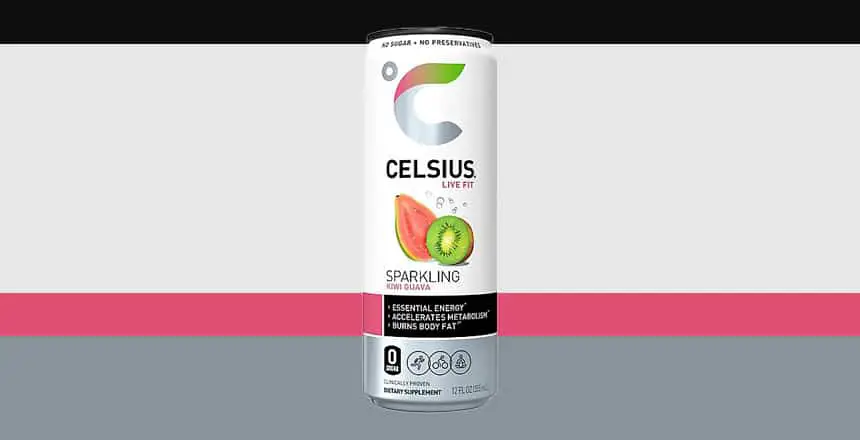
Caffeine is a central component responsible for the stimulating effects of the drink. Celsius derives its caffeine from natural sources such as green tea extract and guarana. Caffeine is a well-known central nervous system stimulant.
The exact caffeine content in Celsius can vary between flavors, but it generally ranges from 100 to 300 milligrams per 12-ounce can.
Here is overview of Caffeine content in Celsius drinks.
| Celsius Product | Caffeine Content |
|---|---|
| Celsius Originals (12 fl oz can) | Approximately 200 mg |
| Celsius Naturals (12 fl oz can) | Approximately 200 mg |
| Celsius Heat (16 fl oz can) | Approximately 300 mg |
| Celsius On-the-Go Powder Sticks | Approximately 200 mg |
Lowest caffeine content is in CELSIUS BCAA. According to Celsius official website, CELSIUS BCAA contains 100 mg of caffeine per can.
Celsius have a higher caffeine concentration compared to a standard 8-ounce cup of brewed coffee, which typically contains around 95 milligrams.
It’s crucial to note that the larger serving size of Celsius contributes to this higher caffeine level. In comparison, an espresso shot, a concentrated coffee beverage, contains approximately 63 milligrams of caffeine in just 1 ounce.
Tea, on the other hand, generally has lower caffeine content, averaging around 40-70 milligrams per 8-ounce cup.
The U.S. FDA recommends a daily caffeine intake of up to 400 milligrams for most adults. Combining caffeine sources, such as Celsius and other beverages, can have synergistic effects, emphasizing the need for moderation.
Pregnant and breastfeeding women should aim for less than 200mg. So, Breastfeeding women should not drink more than one Celsius per day.
Please be aware that the caffeine content in other energy drinks can vary. Here are approximate values for some popular energy drinks:
- Red Bull (8.4 oz): 80 milligrams
- Monster Energy (16 oz): 160 milligrams
- Rockstar Energy (16 oz): 160 milligrams
- Bang Energy (16 oz): 300 milligrams
- Coca-Cola (12 oz): Approximately 34 milligrams
It’s essential for consumers to consider the serving size and caffeine content of beverages when managing their overall caffeine intake.
According to experts, The caffeine content in Celsius drinks may contribute to a temporary increase in metabolism, potentially supporting calorie burning and fat oxidation.
Caffeine has been shown to enhance physical performance by increasing adrenaline levels and mobilizing fatty acids from the fat tissues, providing an additional energy source for muscles.
Excessive caffeine intake (200mg is the recommended daily limit) can lead to negative effects, including insomnia, increased heart rate, and heightened anxiety. It’s important to be mindful of individual caffeine sensitivity and potential adverse reactions.
Calories in Celsius drinks
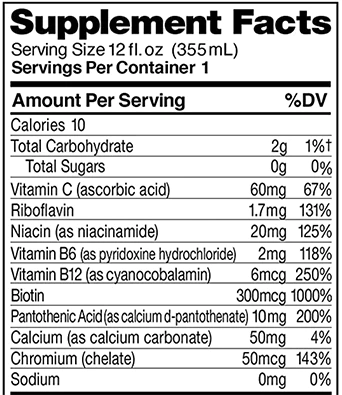
Celsius Energy Drinks are formulated to be low in calories compared to traditional sodas and energy drinks that are high in sugars and calories.
Most Celsius flavors contain 10 calories per 12-ounce can, making them a low-calorie beverage option.
Some flavors, like the HEAT line, might have slightly higher calorie counts due to additional ingredients, but typically remain under 20 calories per can.
To achieve sweetness without added calories, Celsius often includes artificial sweeteners like sucralose.
Celsius can be a low-calorie beverage option as part of a balanced diet, but don’t rely solely on it for weight management or metabolic benefits.
| Nutrient | Celsius Originals | Celsius Naturals | Celsius Heat | Daily Recommended Intake (Approx.) |
|---|---|---|---|---|
| Calories (per can) | 10 | 10 | 15 | 2000-2500 kcal (varies by factors) |
| Sugars (per can) | Minimal to none | Minimal to none | Low | < 25 grams (added sugars) |
| Carbohydrates (per can) | < 2 grams | Low | Moderate | 225-325 grams |
Daily recommended calorie, sugar, and carbohydrate intake can vary depending on individual factors like age, activity level, and health conditions.
Health claims made by Celsius : Are they true?
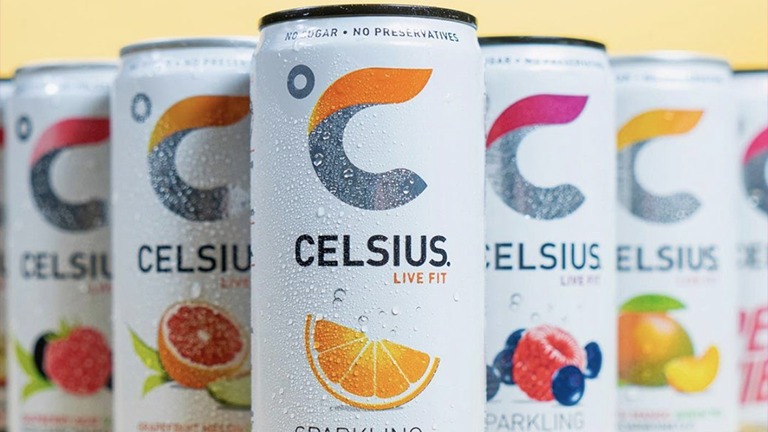
Celsius Energy Drinks make several health claims related to their ingredients and intended effects. But in reality, are Celsius energy drinks healthy? Let’s examine these claims and their accuracy based on available scientific evidence:
Does Celsius boost energy?
Celsius claims to boost energy through its combination of ingredients, including caffeine, green tea extract, guarana, and various B vitamins.
Caffeine is a well-known stimulant that can enhance alertness and reduce perceived fatigue by blocking adenosine receptors in the brain. Green tea extract and guarana also contribute to the beverage’s stimulating effects due to their caffeine content.
Additionally, B vitamins play a role in energy metabolism, aiding in the conversion of food into energy. While some users may experience increased energy levels after consuming Celsius, individual responses can vary, and the effectiveness of the energy-boosting claims may depend on factors such as sensitivity to caffeine and overall health.
Does Celsius burn fat?
The claim that Celsius ingredients like green tea extract and citrus peel extract enhance fat burning is based on some research suggesting they might increase thermogenesis (heat generation) and calorie burning.
According to a study published in 2007, researchers investigated the metabolic responses to the acute ingestion of two carbonated beverages, Celsius™ and Diet Coke®.
The study involved twenty healthy participants, and the results revealed a significant increase in metabolic rate after consuming Celsius™, compared to negligible changes with Diet Coke®.
Specifically, the metabolic rate showed notable rises at 1, 2, and 3 hours post-ingestion of Celsius™. While Diet Coke® induced small and statistically insignificant increases in metabolic rate, no differences were observed in respiratory exchange ratio between the two beverages.
The study suggests that Celsius™ has acute thermogenic properties, but the potential effects of long-term consumption on body composition remain uncertain based on these initial findings.
A study involving 856 students found that those who consumed energy drinks, akin to what’s found in Celsius, showed connections with concerns about looks, weight loss attempts, and unhealthy behaviors like vomiting.
This suggests that while Celsius ingredients may have certain effects, there are potential psychological and behavioral impacts associated with their consumption.
Read more: Is Celsius Energy Drink Keto Friendly?
Does Celsius Boost Metabolism?
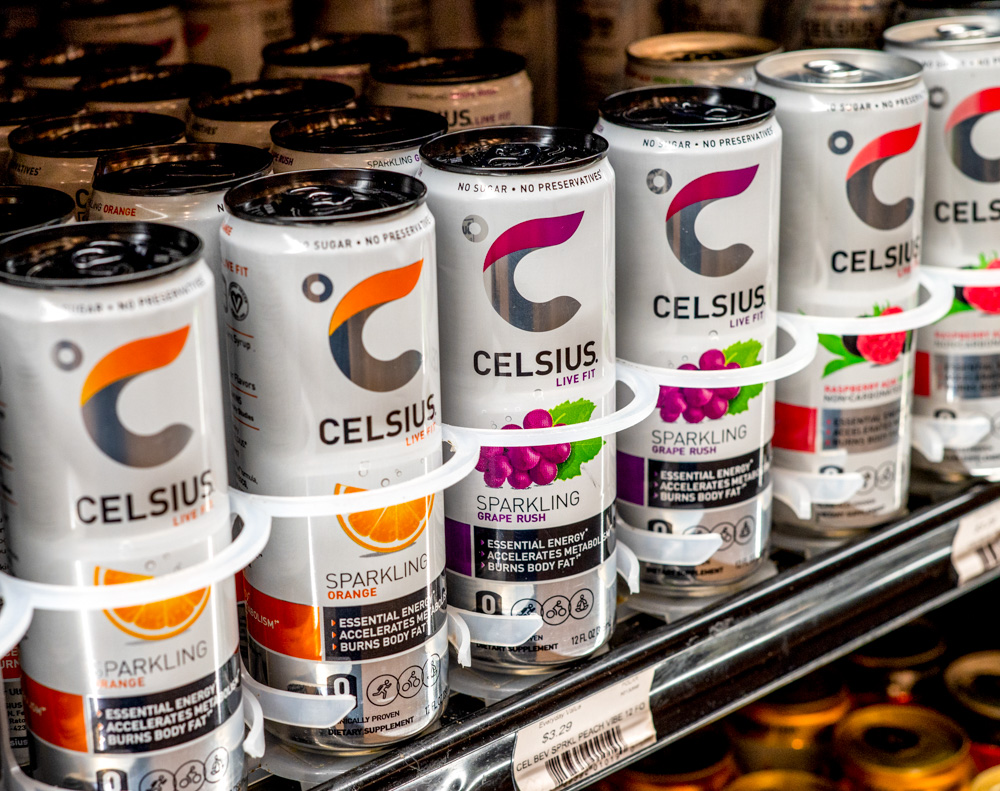
Celsius Energy Drinks claim to boost metabolism, primarily attributing this effect to key ingredients like caffeine, green tea extract, and guarana. Research suggests that these ingredients do have metabolic effects, but the extent of their impact and the overall contribution to weight management can vary.
A study published in National library of medicine, aimed to investigate the acute effects of ingesting a thermogenic drink, specifically Celsius (TD), on changes in metabolism and lipolysis.
The study suggests that the immediate effects of consuming Celsius (TD) include a notable increase in energy expenditure and higher levels of circulating free fatty acids (FFA).
While there were observed non-significant decreases in substrate oxidation and glycerol levels over time, it highlights the need for further exploration.
Future research should delve into the prolonged daily consumption of TD, aiming to unravel its impact on sustained energy expenditure, alterations in body composition, and its efficacy in supporting weight loss or maintenance.
I’m telling you, Never ever drink CELSIUS on empty stomach. The caffeine hits hard, potentially causing nausea, jitters, and digestive upset. High acidity can trigger heartburn, and artificial sweeteners may lead to later cravings. Plus, with no food to balance its kick, blood sugar spikes and crashes worsen hunger and energy dips. Stick to food first, Celsius second, for a smoother ride.
Does Celsius Improve Performance?
Celsius energy drink has garnered attention for its potential impact on physical performance. This exploration delves into the question: Does Celsius truly enhance performance?
While individual responses can vary, some studies propose positive effects of caffeine-containing beverages on performance.
Celsius, with its caffeine and additional performance-oriented ingredients, may contribute to enhanced physical performance for some individuals, especially when combined with regular exercise.
A medical research showed that the energy drink alone had no significant impact on body composition, fitness, or strength.
However, when combined with exercise, the energy drink led to notable improvements in fat mass reduction, percentage body fat, and increased cardiorespiratory fitness (VO2peak).
The study found no adverse effects on health markers and mood due to energy drink use. In conclusion, a low-calorie energy drink alone may not enhance physical outcomes in sedentary males, but when paired with exercise, it showed positive effects on physiological adaptations related to combined aerobic and resistance training.
Are Celsius drinks bad for you?
Consuming Celsius drinks in moderation, adhering to recommended daily caffeine limits (around 400mg for most adults), is generally considered safe for many individuals. However, excessive consumption can lead to adverse effects such as increased heart rate and sleep disturbances.
Celsius drinks are marketed with various claimed benefits, including increased energy and metabolism. However, it’s important for consumers to approach these assertions with a degree of skepticism.
While the ingredients in Celsius, such as caffeine, green tea extract, and B vitamins, may contribute to certain physiological effects, the extent of these benefits and their impact on individuals can vary.
The marketing claims should be viewed with caution, as the science supporting some of these assertions may have limitations, and individual responses to the ingredients can differ.
Celsius energy drink side effects
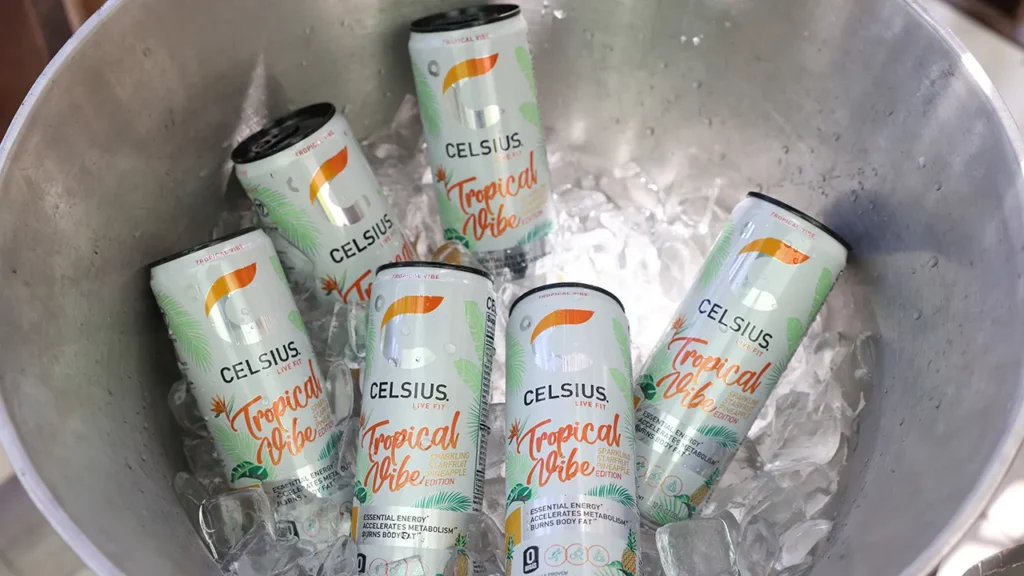
Are Celsius energy drinks healthy? or all this is just marketing claims? While Celsius generally boasts a low-calorie and sugar-free profile, it’s not without potential side effects. Here’s a breakdown of what to be aware of about Celsius energy drink side effects.
1. Insomnia and Sleep Disturbances
Celsius energy drinks contain a significant amount of caffeine, a stimulant known for its potential to interfere with sleep. Consuming these drinks, especially later in the day, may lead to difficulty falling asleep or disrupted sleep patterns.
A study published in NIH explained that consumption of energy drinks like Celsius caused insomnia, stress, shaking hands and depressive moods.
Individuals sensitive to caffeine or those with a history of sleep issues should exercise caution to avoid sleep disturbances.
Celsius drinks last in your body for 4-6 hours. So you should not consume Celsius 5-6 hours before going to sleep.
2. Increased Heart Rate
The caffeine content in Celsius can temporarily elevate heart rate due to its stimulant properties.
While moderate caffeine intake may not pose a risk for most individuals, those with pre-existing cardiovascular conditions should be mindful, as excessive stimulation of the heart can be concerning and potentially lead to complications.
3. Nervousness and Anxiety
According to Mayo Clinic, High caffeine intake due to Energy drinks can trigger feelings of nervousness, restlessness, and increased anxiety. Sensitivity to caffeine varies among individuals, and those prone to anxiety may experience heightened symptoms.
Monitoring personal tolerance and choosing beverages with lower caffeine content may be advisable for individuals prone to anxiety.
4. Digestive Issues
Digestive issues are also one of Celsius energy drink side effects. The acidity of energy drinks, including Celsius, may contribute to digestive discomfort such as acid reflux or upset stomach.
According to experts, energy drinks can affect your digestive system. You may experience heart burn, stomach acidity and acid reflux after consuming energy drinks.
Individuals with pre-existing gastrointestinal conditions should be cautious, as the combination of caffeine and acidity can exacerbate these issues.
5. Jitters and Tremors
Excessive caffeine intake can lead to physical symptoms like jitteriness, shakiness, or tremors. While these effects are generally temporary and subside as caffeine is metabolized, individuals susceptible to these sensations should moderate their consumption to avoid discomfort.
6. Dependency
Another Celsius energy drink side effects is dependency. Regular and high consumption of energy drinks can potentially lead to caffeine dependency.
This means the body becomes accustomed to a certain level of caffeine, and withdrawal symptoms may occur when not consumed. Gradually reducing caffeine intake can help mitigate dependency issues.
7. Dehydration
Caffeine is a diuretic, promoting increased urine production and potentially leading to dehydration if adequate fluids are not consumed.
It’s crucial for individuals drinking Celsius to balance their intake with water to maintain proper hydration levels and minimize the risk of dehydration-related issues.
Do you know Sugar-Free Energy Drinks Like Celsius are Bad for Your Teeth due to acidic components in them.
Celsius Drink Lawsuit and controversies
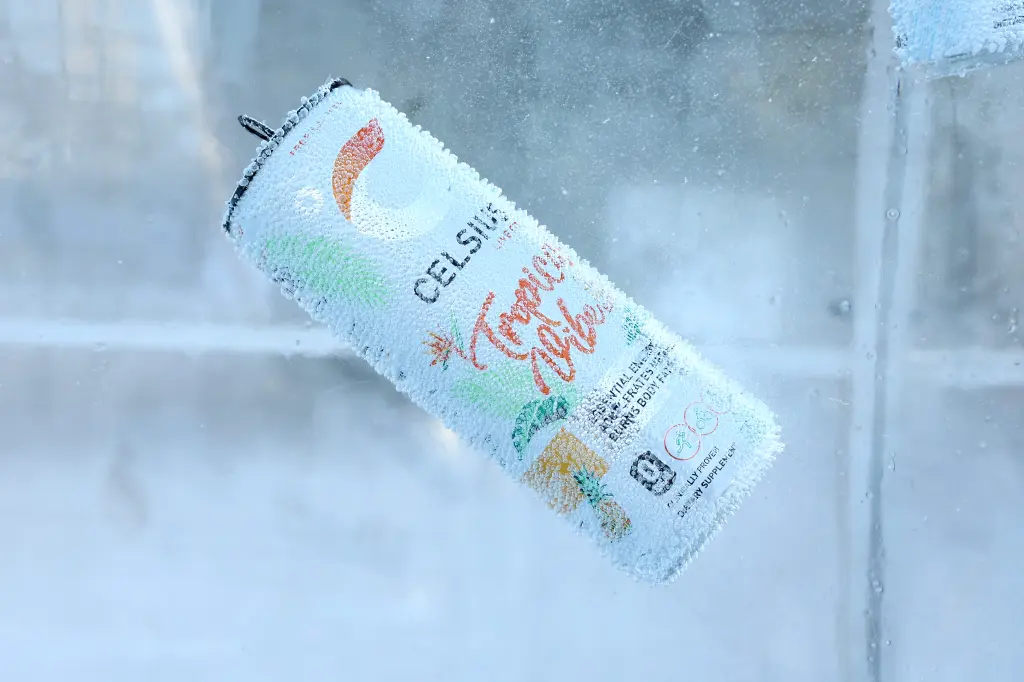
In 2022, Celsius faced a class-action lawsuit alleging deceptive marketing practices related to its claim of being “preservative-free” despite containing citric acid, a known preservative.
Celsius denied the allegations, arguing citric acid is primarily used for flavoring and not preservation in their drinks.
However, they eventually settled the lawsuit in 2023, agreeing to Change their labels to clarify the presence of citric acid and offer refunds to eligible consumers who purchased Celsius drinks during the specified period. According to Today.com, Celsius class settlement could get you $250.
Celsius labels now include citric acid in the ingredients list. The deadline to claim a refund has passed. It was February 13th, 2023. Information about the settlement can still be found at the official settlement website.
Former employees sued Celsius alleging the company manipulated stock options to their disadvantage. This raises ethical concerns about employee compensation and potential mismanagement.
Some flavors use sucralose, which, while calorie-free, can disrupt gut bacteria and potentially impact blood sugar control in some people. This raises concerns about long-term health consequences and the lack of transparency regarding sugar alternatives.
Why is Celsius not FDA approved?
Celsius, the popular energy drink, faces a lack of approval from the Food and Drug Administration (FDA), primarily due to its use of guarana.
Guarana is a natural source of caffeine derived from the seeds of the Paullinia cupana plant, native to the Amazon basin. The FDA’s hesitancy to approve Celsius is in line with its regulations and scrutiny over certain ingredients in dietary supplements and energy drinks.
The inclusion of guarana in Celsius, which contains higher caffeine levels than coffee beans, raises concerns about potential health effects and aligns with the FDA’s cautious approach to substances that may impact consumers, especially young adults and athletes.
The FDA, responsible for ensuring the safety and effectiveness of food and dietary supplements, requires thorough evaluations of ingredients and their potential risks before granting approval.
Why did Celsius get banned by NCCA?
Celsius faced a ban from the National College Athletic Association (NCAA) due to the presence of certain substances in the energy drink that were deemed to provide an “unfair advantage” to athletes.
The ban is rooted in the NCAA’s longstanding scrutiny of caffeine consumption by athletes. In a press release from 2009, the NCAA had already acknowledged the prohibition of substances such as guarana, a key ingredient in Celsius drinks.
Despite the ban, Celsius experienced a surge in sales and consumption over recent years. The drink’s notable increase in popularity, coupled with its rising usage among collegiate athletes, drew attention to its composition.
The NCAA, in its efforts to regulate and maintain fairness in sports, identified the inclusion of guarana and other substances in Celsius as a potential violation of its anti-doping policies.
Why is Celsius being recalled?
Currently, there isn’t a nationwide recall of Celsius drinks across all markets. However, they have been subject to recalls in specific locations due to different concerns:
Canada: In October 2023, the Canadian Food Inspection Agency (CFIA) issued a recall for several Celsius energy drink mixes due to:
- Improper caffeine content exceeding the allowed limit of 180mg per serving.
- Missing bilingual labelling requirements.
Who should avoid Celsius energy drinks
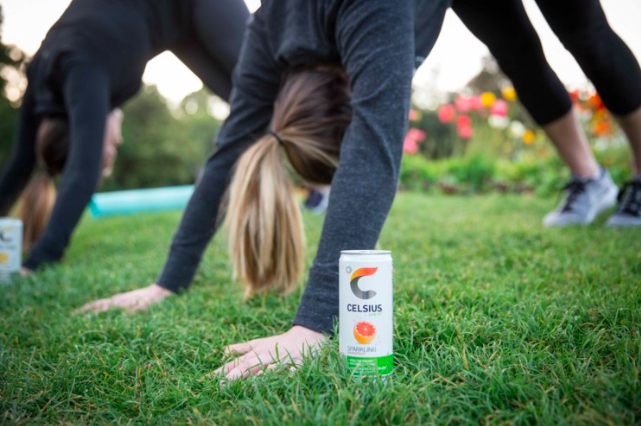
Are Celsius energy drinks healthy for everyone? Absolutely not! Celsius energy drinks contain caffeine and other ingredients that may have varying effects on individuals.
While some people may tolerate these beverages well, there are certain groups of individuals who should consider avoiding or limiting their consumption of Celsius energy drinks:
Sensitivity to Caffeine
Individuals who are sensitive to caffeine or experience adverse effects, such as jitteriness, insomnia, or an increased heart rate, should exercise caution when consuming Celsius drinks.
Caffeine sensitivity varies among individuals, and those with lower tolerance levels may be more susceptible to the stimulating effects of caffeine present in Celsius energy drinks.
Pregnant or Breastfeeding Women
Pregnant and nursing women are generally advised to limit their caffeine intake, as excessive caffeine consumption during pregnancy may pose risks to fetal development.
High caffeine intake during pregnancy has been linked to increased risk of miscarriage, low birth weight, and infant hyperactivity. Research suggests limiting caffeine intake to 200mg per day during pregnancy and avoiding it altogether while breastfeeding.
The American Academy of Pediatrics (AAP) recommends avoiding energy drinks during pregnancy and breastfeeding due to potential risks associated with caffeine and other ingredients.
I have explained this in my detailed analysis of Energy Drinks like Celsius while breastfeeding. If you are a breastfeeding women, you should not consume more than 300 mg of caffeine per day according to American Academy of Pediatrics (AAP). This means, consuming one Celsius drink per day(which contains 200 mg of caffeine) is considered safe.
However, you must monitor your total caffeine intake from other foods too, as consuming too much caffeine can affect your baby negatively.
It is advisable for women in these situations to consult with healthcare professionals to determine an appropriate level of caffeine intake, taking into consideration energy drinks like Celsius.
Individuals with Certain Medical Conditions
People with specific medical conditions, including cardiovascular issues, hypertension, anxiety disorders, or other sensitivities, should seek guidance from healthcare providers before incorporating energy drinks into their diet.
The stimulant effects of caffeine and other ingredients in Celsius may have potential interactions with certain health conditions.
Children and Adolescents
Energy drinks, including Celsius, are not recommended for children and adolescents due to their developing physiological systems and potential sensitivity to caffeine.
CDC recommends children under age of 12 should completely avoid Celsius and other energy drinks. And recommended intakes of Caffeine for people of age 12 to 18 should not be more than 100 mg per day.
2023 Nutrients review analyzed numerous studies and highlighted the cardiovascular risks associated with energy drinks in adolescents, particularly those with pre-existing heart conditions. It raises concerns about potential damage to young hearts and circulatory systems.
A article published on Statista.com in 2018 revealed energy drinks consumption by age groups. As you can see in chart below.
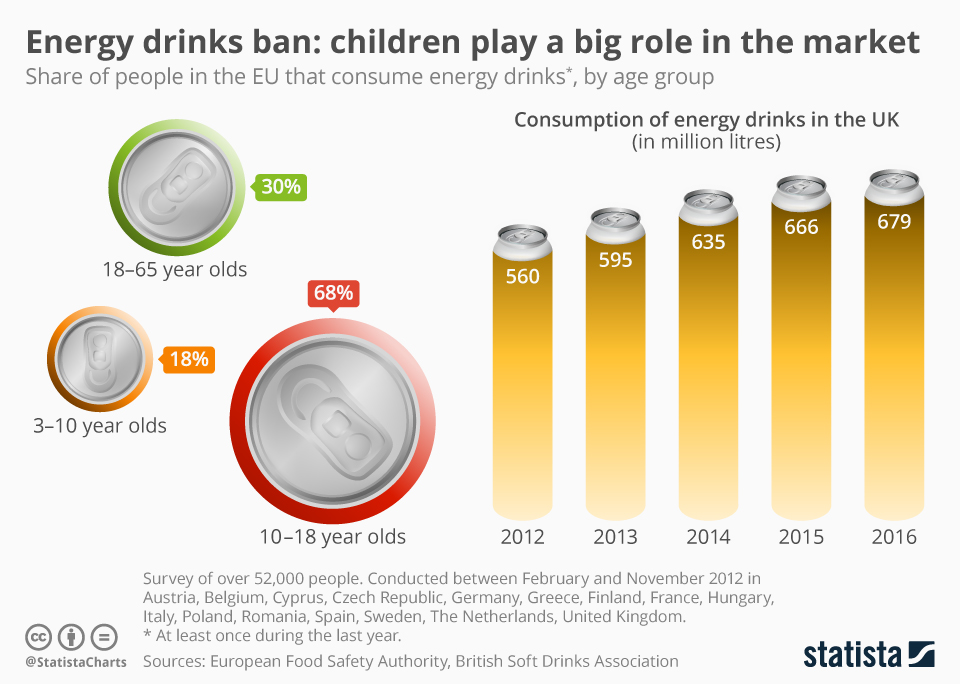
The American Academy of Pediatrics discourages the consumption of energy drinks by individuals in these age groups to promote their overall well-being.
Those with Sensitivity to Ingredients
Individuals with known sensitivities or allergies to specific ingredients in Celsius, such as taurine or guarana, should avoid these drinks to prevent potential allergic reactions.
Checking the ingredient list and consulting with healthcare professionals can help individuals make informed decisions based on their specific sensitivities.
Celsius energy drink Reviews: Is Celsius drink good?
Celsius energy drinks are a popular choice for those seeking a boost of energy without the crash associated with sugary drinks.
They’re packed with vitamins, minerals, and other ingredients like green tea extract and guarana that are purported to have health benefits. But what do the reviews say?
Celsius comes in a variety of flavors, from the classic Orange and Peach Mango to the more adventurous Cranberry Lime and Strawberry Kiwi.
Most reviewers find the flavors to be refreshing and not overly sweet, even for the zero-sugar options.
Many reviewers report feeling a noticeable energy boost after drinking Celsius, without the jitters or crash often associated with sugary energy drinks. The caffeine content (200mg per can) is comparable to a cup of coffee, so it’s definitely not for the faint of heart.
Some reviewers report experiencing bloating after drinking Celsius, which could be due to the carbonation or artificial sweeteners.
Conclusion: Are Celsius energy drinks healthy
In conclusion, are Celsius energy drinks healthy is a nuanced consideration. While they claim to provide benefits like improved metabolism and energy, their actual impact varies among individuals.
The presence of ingredients like caffeine, guarana, and taurine raises concerns, especially for certain groups such as pregnant women, breastfeeding mothers, and children.
Research studies suggest potential thermogenic effects but underscore the need for further investigation into prolonged use. Users should be cautious, considering individual health conditions, and seek professional advice.
Pros and cons of Celsius energy drinks
| Pros | Cons |
|---|---|
| Zero calories and sugar | High caffeine content (potential for side effects) |
| Moderate caffeine content | Not recommended for certain groups (pregnant/breastfeeding women, children, individuals with specific health conditions) |
| Some beneficial ingredients (green tea extract, B vitamins) | Potential for adverse effects from other ingredients (guarana seed extract) |
| Lower in certain undesirable ingredients (artificial colors, excessive sugar) | Not a substitute for a healthy diet |
FAQS
Is Celsius an energy drink?
Yes, Celsius is classified as an energy drink. It is marketed as a fitness drink that claims to boost metabolism and provide sustained energy through its combination of natural ingredients and caffeine.
Does Celsius drink help you focus?
Celsius Energy Drink claims to offer enhanced mental focus among its benefits, but the evidence is mixed and individual responses can vary.
The main stimulant in Celsius, caffeine has well-established research backing its ability to improve alertness, vigilance, and reaction time. This can indirectly lead to better focus by minimizing distractions and fatigue.
Is Celsius drink good for weight loss?
Celsius claims to be beneficial for weight loss due to its ingredients, such as caffeine, green tea extract, and guarana, which are believed to boost metabolism and fat burning.
However, the effectiveness can vary among individuals, and research supporting these claims is limited. While some studies suggest that the ingredients in Celsius may have a modest impact on metabolism and fat oxidation, the overall contribution to significant weight loss remains uncertain.
Some people claimed that Celsius drinks contain weight loss drug Ozempic in it. Claims that Celsius drinks contain Ozempic for weight loss are completely false and potentially harmful.
It’s important to note that Celsius isn’t a magic weight loss solution and should be consumed in moderation as part of a healthy lifestyle.
Does Celsius burn fat without exercise?
Celsius itself won’t magically melt away fat without any effort on your part. While it does contain ingredients like caffeine and green tea extract that have been linked to potential fat-burning effects in combination with exercise and a healthy diet, it’s crucial to manage expectations.
Use Celsius (in moderation) as a potential pre-workout boost, not a magic fat-burning potion. Read more about when is best time to drink Celsius drinks to avoid possible side effects.
Are Celsius drinks bad for your heart?
Celsius can be bad for your heart if consumed excessively because of its high caffeine content. For healthy adults, 1-2 cans per day are considered moderately safe. However, avoid Celsius if you have heart conditions, anxiety, sleep issues, or high blood pressure.
Does Celsius raise blood pressure?
Yes, Celsius drinks contain caffeine and other stimulants that can temporarily raise blood pressure, especially for those sensitive to caffeine.
Here’s how Celsius raises blood pressure:
Celsius drinks pack a punch with caffeine (200mg per can) and other stimulants like guarana, which act on your nervous system. This triggers your body to constrict blood vessels, causing a temporary rise in blood pressure. Sensitive individuals or those with existing conditions might experience a more pronounced effect.
Is Celsius bad for your liver?
Excessive consumption of Celsius drinks may pose risks to liver health. Some ingredients, like guarana and taurine, could potentially strain the liver. However, more research is needed to establish a direct link between Celsius and liver damage.
However, according to Celsius official website, Celsius drinks are not bad for liver if consumed in moderation. If you experience liver problem, then you might be consuming too much Celsius drinks.
Is Celsius bad for your stomach?
Celsius can upset your stomach in some ways. The high caffeine (200mg per can) can cause nausea, indigestion, and diarrhea, especially for people sensitive to caffeine.
Artificial sweeteners like sucralose can also trigger digestive issues. Additionally, the acidity and carbonation in Celsius can irritate the stomach lining for some.
However, for healthy adults, 1-2 cans occasionally probably won’t cause problems. But if you’re sensitive, have pre-existing stomach conditions like gastritis or ulcers, or experience any discomfort, choose alternatives like unsweetened iced tea, sparkling water, or natural energy boosters. Moderation and listening to your body are key!
Is Celsius good for diabetics?
Celsius drinks may not be suitable for individuals with diabetes due to their high caffeine content, added sugars, and other stimulating ingredients.
Caffeine can potentially affect blood sugar levels and insulin sensitivity. Moreover, the added sugars in Celsius may contribute to unhealthy spikes in blood glucose.
Despite claims of being sugar-free like Propel or Zero Gatorade, Celsius drinks may pose concerns for diabetic individuals, as the specific amounts of certain ingredients, including natural caffeine sources and proprietary blends, are not fully disclosed.
Diabetics are advised to consult with healthcare professionals to determine the appropriateness of consuming such energy drinks, considering their individual health conditions and dietary needs.
Is Celsius bad for your kidneys?
For healthy adults, occasional Celsius (1-2 cans per week) is probably fine. But high caffeine (200mg per can) can stress kidneys, especially if you have pre-existing conditions or high sensitivity.
Artificial sweeteners may also raise concerns. If you have pre-existing kidney issues, hypertension, or high caffeine sensitivity, avoid Celsius.
A recent Scientific study found high consumption (7+ cans/week) linked to increased uric acid, raising kidney stone and gout concerns. Moderate levels showed minor kidney function changes requiring further research.
Does Celsius make you bloated?
Celsius can cause bloating due to its carbonation, artificial sweeteners, acidity, and high caffeine content. If you’re prone to digestive discomfort, it’s best to avoid Celsius or choose non-carbonated flavors without artificial sweeteners.
Opt for gut-friendly alternatives like unsweetened iced tea, sparkling water with lemon, or fruit-infused water to keep your belly happy!
Does Celsius make you poop?
There is no direct evidence or widely reported side effect suggesting that Celsius energy drink specifically causes bowel movements or makes you poop.
So, Celsius might make you poop, but it’s a “maybe” depending on your unique biology and sensitivity. Some experience looser stools, while others feel no difference.
While individual user reports mention laxative effects, scientific evidence directly linking Celsius to pooping is limited.
Are Celsius drinks bad for your skin?
There is no direct evidence suggesting that Celsius drinks are inherently bad for the skin. However, some users have reported experiencing acne breakouts after consuming Celsius. Skin reactions can vary among individuals, and factors like diet and hydration levels may contribute to such effects.
Can Celsius Energy Drink give you cancer?
There is no credible evidence to suggest that Celsius Energy Drinks cause cancer. The ingredients in Celsius, such as caffeine, guarana, and taurine, are commonly found in energy drinks and beverages without established links to cancer.
Is Celsius still safe to drink?
For most healthy adults, Celsius is likely okay in moderation (no more than 2 cans per day).
People with heart conditions, anxiety disorders, or sleep disorders should not drink Celsius due to the potential for aggravating their conditions.
Similarly, pregnant or breastfeeding women, children under 18, and those sensitive to other ingredients should avoid it. Celsius energy drink side effects can be avoided with moderate intake.
Are Celsius Energy Drinks Healthy than other energy drinks?
Celsius Energy Drinks can be considered healthier than some other energy drinks.
Celsius might claim a health halo over other energy drinks, but it’s not a clear-cut win. Celsius energy drink side effects are also numerous. While it ditches sugar and boasts vitamins and minerals, its high caffeine content (200mg per can) can trigger anxiety, insomnia, and other woes.
Artificial sweeteners, the sugar-free heroes, might disrupt gut health for some. Plus, claims of boosted metabolism and fat burning lack strong scientific backing.
So, compared to sugary energy drinks, Celsius wins on the calorie and sugar fronts. But against sugar-free competitors, it’s a closer call.
The added vitamins and minerals are a plus, but the caffeine punch and potential gut-grumbling sweeteners require caution.
Is Celsius healthier than Red Bull?
Celsius may be considered healthier than Red Bull by some due to its lack of artificial preservatives, sugar, and higher reliance on natural ingredients.
However, individual health considerations and preferences play a crucial role in determining what’s healthier for a specific person.
Is Celsius better than coffee?
Celsius and coffee serve different purposes. Celsius contains caffeine, natural ingredients, and claims to boost metabolism. Coffee offers a simpler profile but is rich in antioxidants. The choice between them depends on individual preferences and health goals.
Is it okay to drink Celsius every day?
Moderate, occasional consumption of Celsius may be acceptable for some individuals. However, daily intake should be approached with caution, considering caffeine sensitivity and overall dietary habits. Consulting with a healthcare professional is advisable.
Drinking two CELSIUS energy drinks in one day is generally considered safe for most individuals.
Why is Celsius drink so popular?
Celsius has gained popularity for its marketed benefits, including natural ingredients, purported metabolism-boosting properties, and being sugar-free. Effective marketing and increasing consumer interest in healthier beverage alternatives have contributed to its popularity.
How many cups of coffee is one Celsius?
One Celsius drink is roughly equivalent to drinking 4-5 cups of coffee, according to a study. The caffeine content in Celsius should be considered when comparing it to coffee, especially for individuals monitoring their caffeine intake.
Can Celsius energy drinks cause you to fail drug tests?
Celsius drinks may pose a risk of causing individuals to fail drug tests. Some of its ingredients, such as guarana, have been banned by organizations like the NCAA due to their stimulant properties.
Athletes and individuals subject to drug testing should be cautious and consider alternative beverages to avoid potential issues.
Why does Celsius have so much biotin?
Celsius energy drinks contain 30 micrograms of biotin per 12-ounce can, which is 100% of the Daily Value (DV). This might seem like a lot, but there are a few reasons why Celsius includes this much biotin:
1. Marketing: Biotin is often associated with healthy hair, skin, and nails, which aligns with Celsius’s image as a health-conscious energy drink.
Highlighting the presence of biotin can be a way to attract consumers who are looking for an energy drink that also offers some potential health benefits.
2. Potential benefits: Biotin does play a role in several important metabolic processes, including the breakdown of carbohydrates, fats, and amino acids.
It also helps to regulate blood sugar levels. Some studies have suggested that biotin may improve the health of hair, skin, and nails, although more research is needed to confirm these benefits.
3. Low risk: Biotin is a water-soluble vitamin, which means that it is not stored in the body and any excess is simply excreted in the urine. This makes it unlikely that consuming high levels of biotin will cause any harm.
4. Targeting deficiencies: While rare, biotin deficiency can occur in people who consume a very limited diet or who have certain medical conditions.
Including biotin in Celsius could help to prevent deficiencies in these individuals.
However, it’s important to note that there is no concrete evidence that consuming high levels of biotin from energy drinks like Celsius will actually provide any additional health benefits beyond meeting the DV.
Additionally, some people may experience side effects from consuming too much biotin, such as diarrhea or skin rashes.
So, while the high biotin content in Celsius may be a marketing tactic, it’s unlikely to be harmful and could potentially offer some benefits for people who are deficient in this vitamin.
Does Celsius have drugs?
No, Celsius energy drinks do not contain any illegal or controlled substances. This has been definitively confirmed by the company and independent testing.
The rumors about Celsius containing illicit drugs like methamphetamine or cocaine are false and have been debunked by experts.
Does Celsius have L theanine?
No, Celsius energy drinks do not contain L-theanine. In fact, none of the flavors or varieties of Celsius energy drinks contain L-theanine.
Celsius energy drinks are formulated with a proprietary blend of ingredients called MetaPlus®, which includes green tea extract, guarana extract, and B vitamins.
These ingredients are intended to provide sustained energy, burn calories, and enhance focus. However, L-theanine is not included in this blend.
L-theanine is an amino acid that is often found in green tea. It is known for its calming and relaxing effects, and it can help to counteract the jitters that can sometimes be associated with caffeine.
While L-theanine is not present in Celsius drinks, the green tea extract in the MetaPlus® blend may provide some of the same benefits.
If you’re looking for an energy drink that contains L-theanine, there are a few other options on the market. Some popular brands that include L-theanine in their drinks include Rockstar Recovery, Monster Rehab, and Reign.
Does Celsius have red 40?
No, Celsius drinks do not contain Red 40. In fact, Celsius is marketed as a “functional” energy drink that is free from artificial colors, artificial flavors, high fructose corn syrup, aspartame, and other common food additives.
Does Celsius suppress appetite?
Celsius can Possibly suppress appetite, but not definitively.
Celsius contains ingredients like caffeine and green tea extract, linked to temporary appetite reduction. However, research on the drink itself is limited, and individual responses vary.
While some users report feeling less hungry, it’s not a guaranteed effect and shouldn’t replace a healthy diet and exercise for weight management.
Ultimately, whether Celsius affects your appetite is something you’ll need to test for yourself.
Why Celsius makes me hungry?
Despite appetite-suppressing ingredients, Celsius can make you hungrier due to artificial sweeteners, hidden sugars, individual responses, temporary satiety, and psychological factors.
1. Artificial Sweeteners: Some Celsius flavors use artificial sweeteners like sucralose, which can paradoxically stimulate your appetite and lead to cravings later.
2. Hidden Sugars: Not all Celsius flavors are sugar-free. Check the label for added sugars, which can cause blood sugar spikes and dips, triggering hunger pangs.
3. Individual Response: Caffeine affects people differently. While some find it suppresses appetite, others experience an initial energy boost followed by a crash and increased hunger.
4. Temporary Satiety: Ingredients like caffeine and green tea extract might provide a temporary feeling of fullness, but it likely doesn’t address longer-term hunger cues.
5. Psychological Factors: Associating Celsius with “diet” or weight loss attempts can create a fixation on food and lead to counterproductive overeating.

